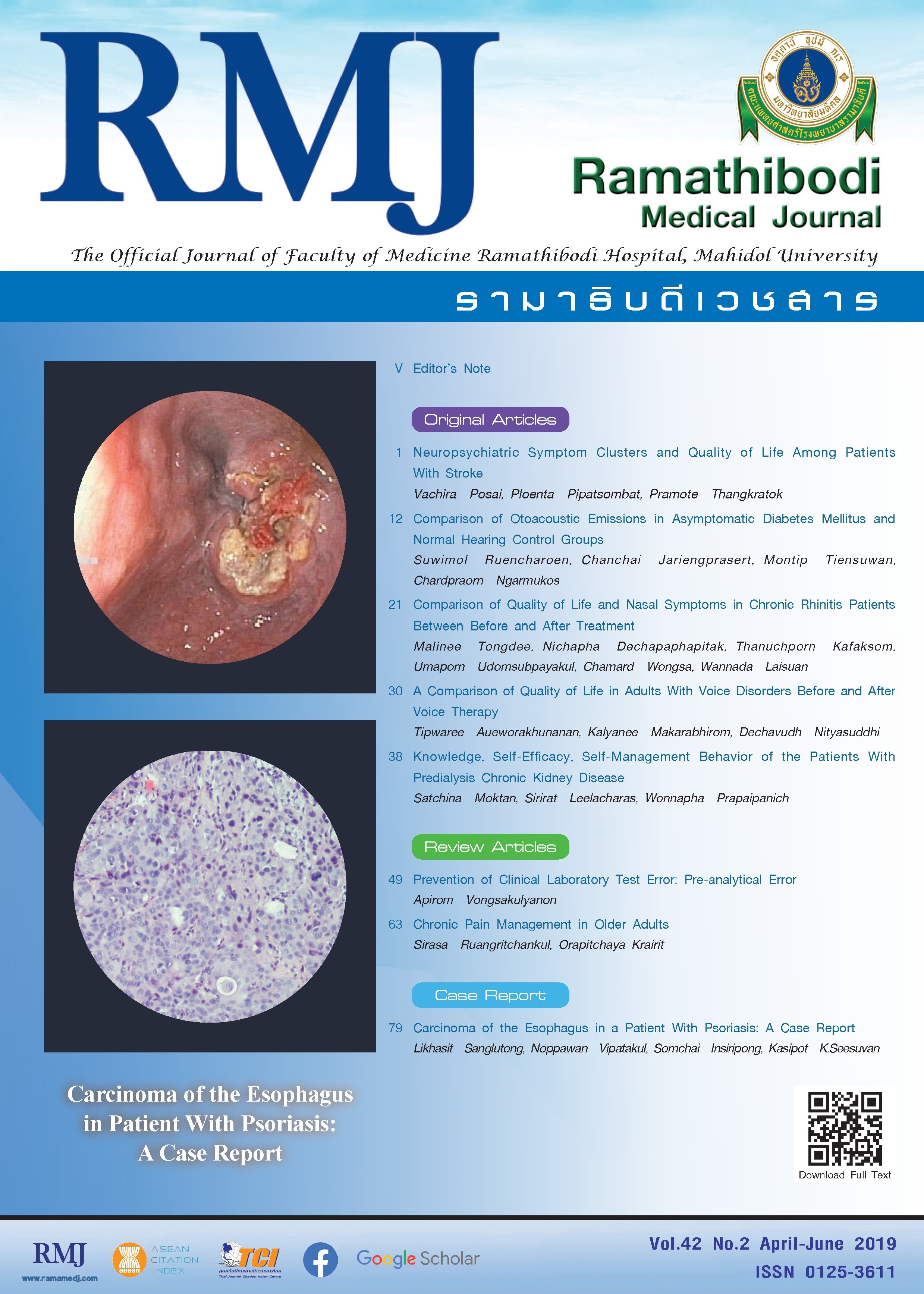Neuropsychiatric Symptom Clusters and Quality of Life Among Patients With Stroke
DOI:
https://doi.org/10.33165/rmj.2019.42.2.168578Keywords:
Stroke, Neuropsychiatric symptom, Quality of life, Symptom clustersAbstract
Background: There are relatively few reports of neuropsychiatric symptom clusters which affect the quality of life in patients with stroke.
Objective: To study neuropsychiatric symptom clusters and the relationship between neuropsychiatric symptom clusters and quality of life among patients with stroke.
Methods: This descriptive study conducted in 140 patients with stroke at Sanpasithiprasong Hospital, Ubon Ratchathani, Thailand; they were selected purposively. Data were collected through patient general and clinical information, the neuropsychiatric symptoms assessment, and the 12-item stroke-specific quality of life scale conducted from September 2018 to January 2019.
Results: The results illustrated that 12 neuropsychiatric symptoms of patients with stroke embraced 3 symptom clusters were psychosis clusters, behavioral problems clusters, and mood disturbance clusters. (average frequency = 1.58, 2.37, 2.49; and average severity = 2.08, 2.73, 2.82, respectively). Among 3 symptom clusters, psychosis (r = 0.289; P < .01), behavioral problems (r = 0.719; P < .01), and mood disturbance (r = 0.716; P < .01) clusters were statistically significantly associated with all aspects of quality of life.
Conclusions: This study showed that neuropsychiatric symptom, especially behavioral problems and mood disturbance clusters were correlated with quality of life among patients with stroke.
References
Suwanwela NC. Stroke epidemiology in Thailand. J Stroke. 2014;16(1):1-7. doi:10.5853/jos.2014.16.1.1.
Thangkratok P. The role of the nurse in the chronic disease management. Songklanagarind J Nurs. 2017;37(2):154-159.
Jitnarin N, Kosulwat V, Rojroongwasinkul N, Boonpraderm A, Haddock CK, Poston WS. Risk factors for overweight and obesity among Thai adults: results of the National Thai Food Consumption Survey. Nutrients. 2010;2(1):60-74. doi:10.3390/nu20100060.
Angelelli P, Paolucci S, Bivona U, et al. Development of neuropsychiatric symptoms in poststroke patients: a cross-sectional study. Acta Psychiatr Scand. 2004;110(1):55-63. doi:10.1111/j.1600-0447.2004.00297.x.
Hachinski V, Iadecola C, Petersen RC, et al. National Institute of Neurological Disorders and Stroke-Canadian Stroke Network vascular cognitive impairment harmonization standards. Stroke. 2006;37(9):2220-2241. doi:10.1161/01.STR.0000237236.88823.47.
Cummings JL. The Neuropsychiatric Inventory: assessing psychopathology in dementia patients. Neurology. 1997;48(5 Suppl 6):S10-S16.
Wong A, Lau AYL, Yang J, et al. Neuropsychiatric symptom clusters in stroke and transient ischemic attack by cognitive status and stroke subtype: frequency and relationships with vascular lesions, brain atrophy and amyloid. PLoS One. 2016;11(9):e0162846. doi:10.1371/journal.pone.0162846.
Kaplan A. Neuropsychiatric symptoms in poststroke patients. Psychiatric Times. 2005;22(1):1.
Samus QM, Rosenblatt A, Onyike C, et al. Correlates of caregiver-rated quality of life in assisted living: the Maryland Assisted Living study. J Gerontol B Psychol Sci Soc Sci. 2006;61(5):P311-P314.
Royall DR, Lauterbach EC, Cummings JL, et al. Executive control function: a review of its promise and challenges for clinical research. A report from the Committee on Research of the American Neuropsychiatric Association. J Neuropsychiatry Clin Neurosci. 2002 Fall;14(4):377-405. doi:10.1176/jnp.14.4.377.
Hackett ML, Köhler S, O'Brien JT, Mead GE. Neuropsychiatric outcomes of stroke. Lancet Neurol. 2014;13(5):525-534. doi:10.1016/S1474-4422(14)70016-X.
Post MW, Boosman H, van Zandvoort MM, Passier PE, Rinkel GJ, Visser-Meily JM. Development and validation of a short version of the stroke specific quality of life scale. J Neurol Neurosurg Psychiatry. 2011;82(3):283-286. doi:10.1136/jnnp.2009.196394.
Kim JS, Choi-Kwon S. Poststroke depression and emotional incontinence: correlation with lesion location. Neurology. 2000;54(9):1805-1810. doi:10.1212/WNL.54.9.1805.
Carota A, Bogousslavsky J. Mood disorders after stroke. Front Neurol Neurosci. 2012;30:70-74. doi:10.1159/000333413.
Kim JS, Choi-Kwon S, Kwon SU, Lee HJ, Park KA, Seo YS. Factors affecting the quality of life after ischemic stroke: young versus old patients. J Clin Neurol. 2005;1(1):59-68. doi:10.3988/jcn.2005.1.1.59.
Choi-Kwon S, Kim HS, Kwon SU, Kim JS. Factors affecting the burden on caregivers of stroke survivors in South Korea. Arch Phys Med Rehabil. 2005;86(5):1043-1048. doi:10.1016/j.apmr.2004.09.013.
Liman TG, Heuschmann PU, Endres M, Floel A, Schwab S, Kolominsky-Rabas PL. Impact of low mini-mental status on health outcome up to 5 years after stroke: the Erlangen Stroke Project. J Neurol. 2012;259(6):1125-1130. doi:10.1007/s00415-011-6312-6.
Bundhamcharoen K, Odton P, Phulkerd S, Tangcharoensathien V. Burden of disease in Thailand: changes in health gap between 1999 and 2004. BMC Public Health. 2011;11:53. doi:10.1186/1471-2458-11-53.
Paradiso S, Robinson RG, Arndt S. Self-reported aggressive behavior in patients with stroke. J Nerv Ment Dis. 1996;184(12):746-753.
Kim JS, Choi S, Kwon SU, Seo YS. Inability to control anger or aggression after stroke. Neurology. 2002;58(7):1106-1108. doi:10.1212/WNL.58.7.1106.
Stone J, Townend E, Kwan J, Haga K, Dennis MS, Sharpe M. Personality change after stroke: some preliminary observations. J Neurol Neurosurg Psychiatry. 2004;75(12):1708-1713. doi:10.1136/jnnp.2004.037887.
Stangeland H, Orgeta V, Bell V. Poststroke psychosis: a systematic review. J Neurol Neurosurg Psychiatry. 2018;89(8):879-885. doi:10.1136/jnnp-2017-317327.

















